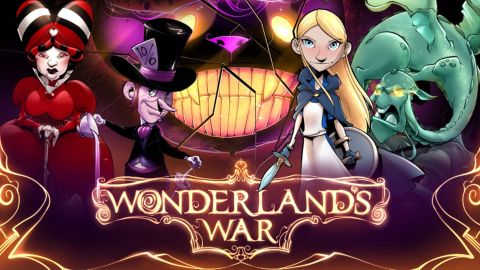GamesRadar+ Verdict
If you can dedicate time to learning Wonderland's War, you'll find a satisfying, ever-escalating series of dilemmas that are brilliantly put together.
Pros
- +
Well-executed risk vs reward
- +
Clever battling system
- +
Betting mechanics
- +
Quirky art-style
Cons
- -
Emphasis on luck-of-the-draw
Why you can trust GamesRadar+
On paper, Wonderland's War shouldn't work. Mixing wargames with Alice in Wonderland? It doesn't make sense. Equally vexing is the fact that board games based on these stories aren't all that common. Lewis Carroll’s Wonderland books are mainstays of fantasy, but they are strangely absent from the gaming canon. It seems reasonable to suppose that this is because their central conceits of lexical nonsense and wordplay don’t translate well into mathematical mechanics.
But it’s too intriguing a proposition for designers to ignore completely. So now we have a new contender in the outsized square box of Wonderland’s War, replete with a crazy-eyed Cheshire Cat on the lid. Is it worth following down the rabbit hole?
What is it, and how does it work?
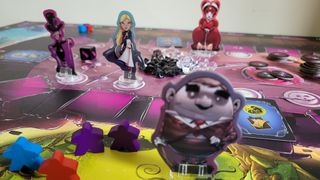
- Game type: Wargame
- Players: 2 - 5
- Difficulty: Moderate
- Lasts: 45 mins
- Ages: 13+
- Price: $50 / £64.99
- Play if you enjoy: Root
Opening that box reveals a suitably colourful chaos of components. There are sheets of cardboard chips to punch out, draw bags in which to put the chips, plastic shards, plastic castles, wooden cubes, discs and meeples, and a slew of standees representing the weird and wonderful Wonderlandian characters (players can choose to be one of several key figures from the novel such as Alice, the Jabberwock, or the Cheshire Cat). All of the above are furnished in a fitting and well-executed semi-cartoon art style that's reminiscent of board games for families, even though Wonderland's War doesn't necessarily fall into that category.
It’s a fitting smorgasbord of pieces for the smorgasbord of rules that make up the game. After a lengthy set-up time, proceedings start with the Mad Hatter’s tea party. Each place-setting at the table holds a card that promises various goodies: they might upgrade your character, add chips to your bag, give you a quest, or recruit a Wonderlandian to your cause. Most cards let you put one or more supporters into a board region too, which means you’ll be battling for it in the next phase.
You can then move as far around the table as you like in order to pick these cards up. But beware; each time you pass the starting point (or by picking up certain cards, for that matter), you’ll gain madness shards. The player with the most shards at the end of the party gets an additional madness chip. And as you can probably guess, these are bad news.
Players tot up their victory points to find the new ruler of Wonderland
Why? Well, players must draw a chip from their bag simultaneously when battling for each region. These provide special abilities (including bonuses that can improve your faction) before adding to the strength total of characters you have in that area. The highest strength total wins the region and the victory points. However, drawing a madness chip will lose you a piece from the region. This can lead to you “busting” and having to drop out of the fight entirely. As such, you'll need to balance manoeuvring with the amount of madness chips you're racking up.
Once these battles are resolved, it’s back to another tea party phase, another battle, and then a third round of both, after which players tot up their victory points to find the new ruler of Wonderland.
Gameplay
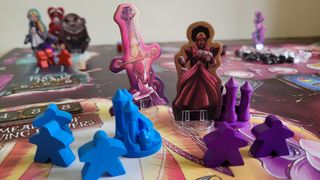
Your first play of Wonderland’s War may fall flat for the same reason that finding an entry point to review it is difficult; making good choices in each phase is dependent on appreciating the nuances of play in the other phase. But the good news is that there are plenty of nuances to appreciate.
Take movement in the tea party. It’s tempting to make full use of roaring around the table to wherever you like, snaffling up the best cards. But doing so risks increasing the madness chips in your bag, and they are a huge liability in the battle phase. Even if you slow down, each pass of the start space refills empty places with new cards, increasing the choice available to your opponents. So sometimes it’s best to creep along and accept a worse card, and sometimes it isn’t. And even then, what constitutes “best”? Does your bag need new chips? Does your character need an upgrade? Or do you want an ally?
It’s a soup that stays delicious right up until the end of the game, salted with the knowledge that any of you can stop the draw at any time
Even before you get into the battle phase, you’re still plagued by quandaries about balancing your resources. It’s tempting to push supporters into regions that look like easy wins. But in doing so, you risk spreading yourself too thin. There are only a limited number of chips in your bag and you’ll need some to be effective in most fights. Your choices aren’t just dictated by the points you can win in each area either, which changes from game to game, but by the quest cards that you and others are holding.
Drawing chips is the culmination of this ever-escalating series of dilemmas. There’s a stern imprecation in the rules that you’re never allowed to peek into the bag and see what you’ve got left. So it helps if you can keep track and remember. But still, every time you plunge your hand in there’s that nagging doubt: did you remember correctly? And even if you did, there are still madness chips lurking in the depths - and the unpredictable interplay between chip special powers - to catch you out. Like so many good board games for adults, there's a lot to juggle.
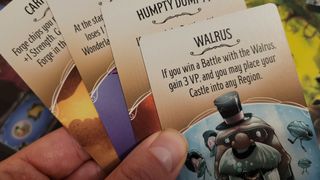
It’s a soup that stays delicious right up until the end of the game, salted with the knowledge that any of you can stop the draw at any time and save your resources.
Multi-way fights are particularly fun, especially given that this is something that’s proven hard to handle in other games, mechanically. The fact players who aren’t contesting get to bet on the outcome is a masterstroke, keeping everyone engaged with every chit pull from the bag.
Yet in both bag draw and bet, Wonderland’s War - as per that other whimsical wargame, Root - can be frustratingly capricious. It’s a game that takes a while to set up and tear down, and repeat plays to appreciate. It’s a game that encourages you to plan, consider, and build combos in your bag. It’s a game, in other words, that requires you to put in some effort to enjoy. And when that effort kicks you in the teeth by pulling a double-madness chip out of a full bag in a critical fight, you can’t help but feel that it’s swindled you to a degree.
Overall - should you buy Wonderland's War?
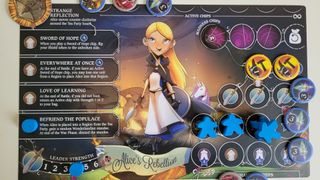
This isn’t an easy game to get into, and the luck element is going to have a certain kind of strategy gamer walking away with their nose stuck in the air. For everyone else, though, if they can find the time and energy to give this a twice-over, there’s a lot to enjoy. Nothing in the mish-mash of mechanics is especially novel, but their combination becomes novel and the unfolding game slips away each time you think you’ve pinned it down. And after you’ve experienced the tactical and visual chaos of Wonderland’s War, it’s hard not to conclude that, hey, it might be a confusing, mercurial affair but... isn’t that how Wonderland should be?
More info
| Genre | Wargame |
Matt is a freelance writer specialising in board games and tabletop. With over a decade of reviews under his belt, he has racked up credits including IGN, Dicebreaker, T3, and The Guardian.

Fallout mod site says it's like players are downloading Skyrim "twice every second" after Amazon TV series drives fans back to the open-world RPGs

Almost every character to ever appear in X-Men comics is featured on this absolutely massive X-Men #700 variant cover

After 19 years, Seth MacFarlane says he has plans for another Family Guy movie - he just hasn't had time to make it
